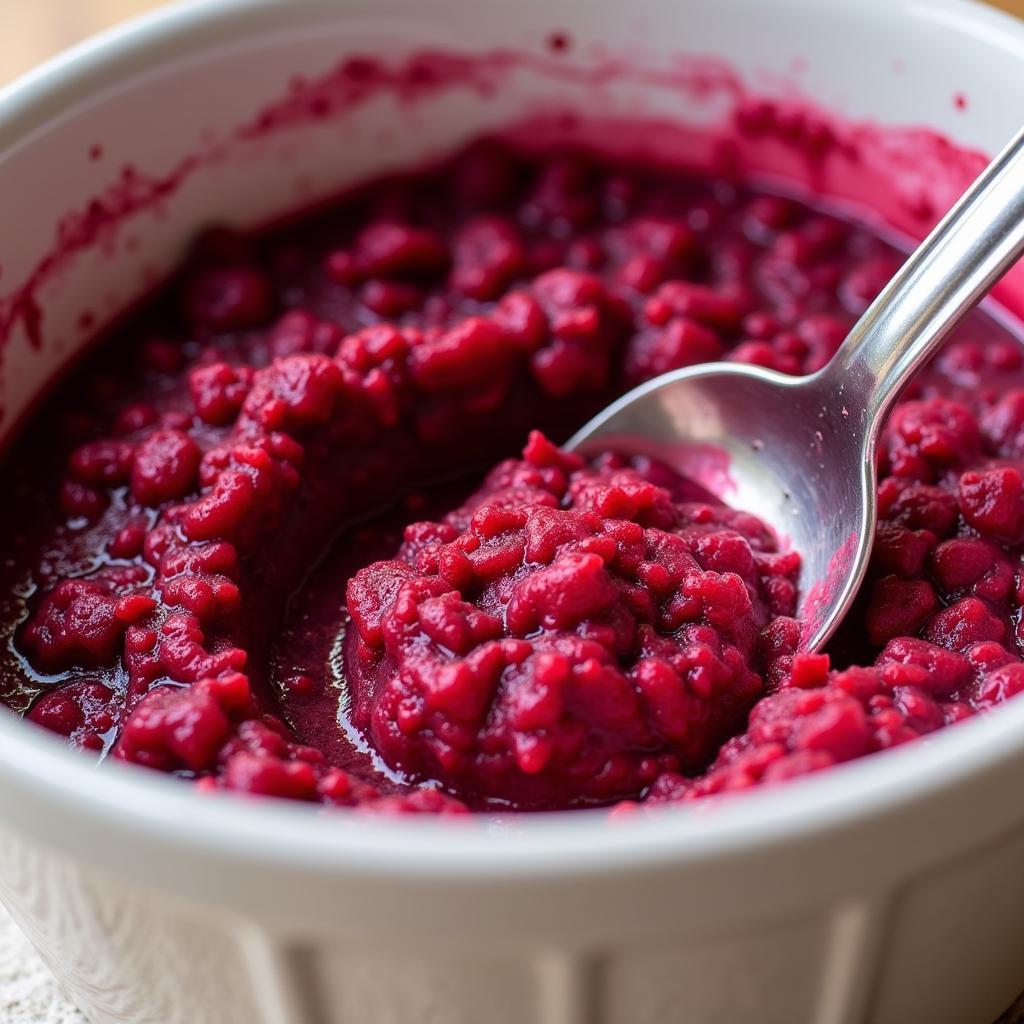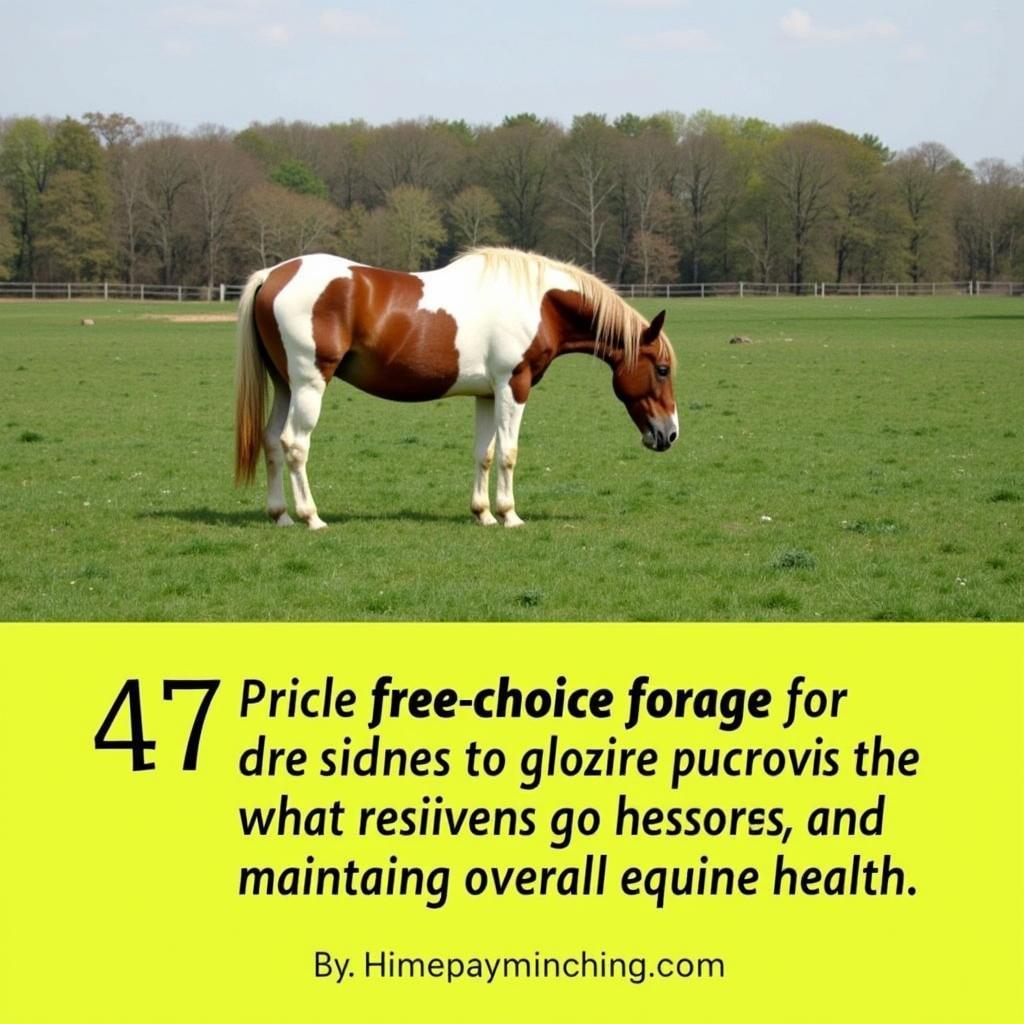Beet Pulp For Horses With Ulcers has become a popular topic of discussion amongst horse owners. This article will delve into the benefits and considerations of using beet pulp as part of a dietary management plan for horses suffering from ulcers. We’ll explore how beet pulp can support digestive health and contribute to a happier, healthier horse.
Understanding Equine Ulcers and Dietary Management
Equine Gastric Ulcer Syndrome (EGUS) is a common condition affecting horses, often caused by stress, intensive training, and inadequate forage intake. Dietary management is a crucial component of treating and preventing ulcers. This includes providing a consistent supply of forage, reducing grain intake, and incorporating ulcer-protective feeds. This is where beet pulp for horses with ulcers can play a beneficial role.
 Beet pulp for horses with ulcer relief
Beet pulp for horses with ulcer relief
The Benefits of Beet Pulp for Horses with Ulcers
Beet pulp is a high-fiber byproduct of sugar beet processing. It’s highly digestible, making it a suitable feed for horses with sensitive stomachs. Soaking beet pulp before feeding is crucial as it expands considerably, reducing the risk of esophageal obstruction and making it easier for horses to digest. Here are some key benefits of beet pulp for horses with ulcers:
- High in Fiber: Beet pulp provides a significant source of fermentable fiber, which helps buffer stomach acid and support a healthy gut microbiome.
- Low in Starch and Sugar: Unlike grain-based feeds, beet pulp is low in starch and sugar, reducing the risk of hindgut acidosis and further irritation to the stomach lining.
- Easy to Digest: Its soft, pulpy texture is gentle on the digestive system, making it ideal for horses recovering from ulcers.
- Palatable: Many horses find beet pulp palatable, making it easier to encourage them to eat, especially when dealing with a decreased appetite due to ulcers.
- Cost-Effective: Beet pulp is a relatively affordable feed option compared to other specialized ulcer feeds.
Incorporating Beet Pulp into Your Horse’s Diet
When introducing beet pulp for horses with ulcers, start with small quantities and gradually increase the amount over several days to allow the horse’s digestive system to adjust. Soaking the beet pulp for at least 30 minutes, or until soft and expanded, is essential.
How Much Beet Pulp Should You Feed a Horse with Ulcers?
The appropriate amount of beet pulp will vary depending on the individual horse’s needs, size, and overall diet. Consult with your veterinarian or equine nutritionist for personalized recommendations. Typically, beet pulp is fed in conjunction with other forage sources and supplements, forming a comprehensive dietary plan for ulcer management.
Dr. Emily Carter, DVM, a renowned equine veterinarian specializing in digestive health, suggests, “Beet pulp can be a valuable addition to the diet of horses with ulcers, but it’s crucial to remember that it is not a cure-all. It should be part of a holistic approach that addresses all contributing factors to ulcer development.”
Beyond Beet Pulp: A Holistic Approach to Ulcer Management
While beet pulp can offer significant benefits for horses with ulcers, it’s essential to remember that it’s just one piece of the puzzle. A comprehensive approach to ulcer management should involve:
- Veterinary Care: Proper diagnosis and treatment from a veterinarian are essential.
- Stress Reduction: Minimizing stress through appropriate management practices, such as turnout time with companions, can help prevent ulcer recurrence.
- Forage First: Providing a constant supply of good quality forage is crucial for buffering stomach acid and promoting digestive health.
 Horse grazing to prevent ulcers
Horse grazing to prevent ulcers
Conclusion
Beet pulp for horses with ulcers can be a beneficial addition to a comprehensive dietary management plan. Its high fiber content, low starch and sugar levels, and easy digestibility make it a suitable feed for sensitive stomachs. However, it is essential to remember that it is not a standalone cure and should be used in conjunction with other management strategies, including veterinary care, stress reduction, and a forage-first approach. By taking a holistic approach, you can help your horse recover from ulcers and maintain long-term digestive health.
FAQs
- Can beet pulp cure ulcers in horses?
No, beet pulp cannot cure ulcers, but it can support digestive health as part of a comprehensive treatment plan. - How do you prepare beet pulp for horses?
Soak beet pulp in water for at least 30 minutes or until soft and expanded. - Can all horses eat beet pulp?
While generally safe, consult your vet before introducing any new feed, especially if your horse has specific dietary restrictions. - What are other ways to prevent ulcers in horses?
Stress reduction, free-choice forage, and minimizing starch intake are crucial. - Can I feed beet pulp dry?
It is not recommended to feed beet pulp dry as it can expand in the esophagus and cause choking. - How much beet pulp should I feed my horse?
Consult your veterinarian for personalized recommendations. - Can beet pulp be fed alongside medication for ulcers?
Yes, beet pulp can be fed alongside medication prescribed by your veterinarian.
For further information on equine dental care, check out our article on chopped hay for horses with bad teeth.
Need more help? Contact us at Phone Number: 0772127271, Email: [email protected] or visit our address: QGM2+WX2, Vị Trung, Vị Thuỷ, Hậu Giang, Việt Nam. We have a 24/7 customer support team.